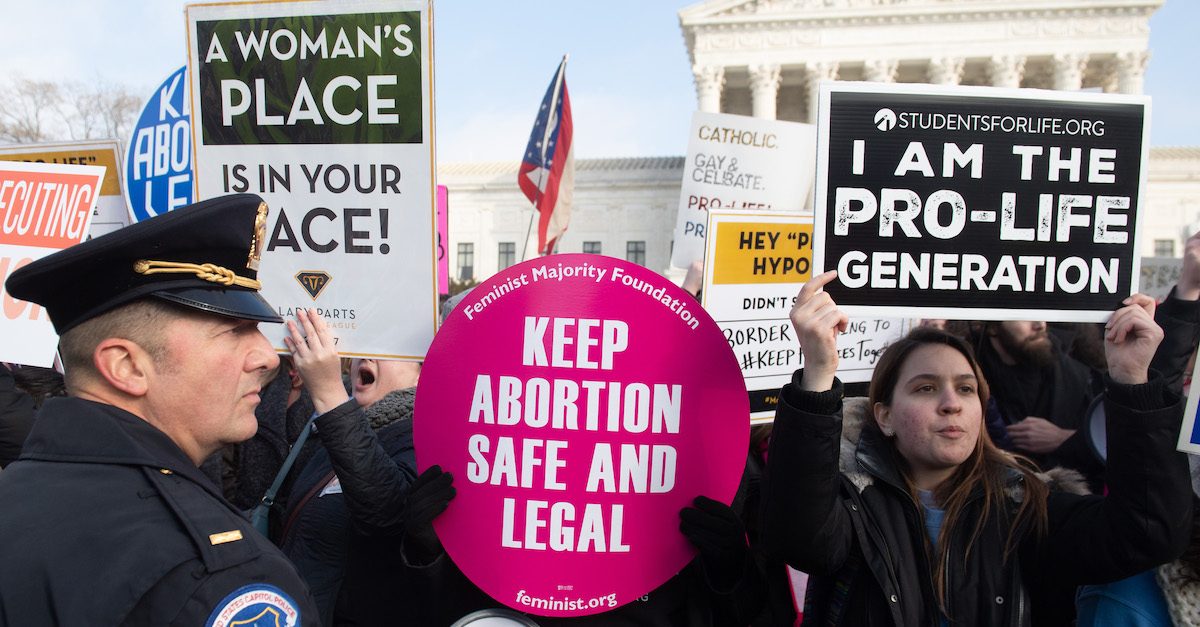
A bloc of more than 200 Republican lawmakers on Thursday asked the U.S. Supreme Court to reconsider two of the Court’s landmark abortion rights cases, calling the current precedents unworkable, and encouraging the justices to reconsider the “right to abortion” found in 1973’s Roe v. Wade decision.
The amicus brief was submitted by 39 Senators and 168 Members of the House of Representatives in the Court’s upcoming case June Medical Services LLC v. Gee. Pro-life Democrat Rep. Daniel Lipinski (D-Illinois) also signed the brief.
It will be the first abortion-related case to come before the Court since President Donald Trump appointed two staunchly conservative justices to the bench, and congressional Republicans are making their case for major changes to current federal law.
As previously reported by Law&Crime, the controversy centers on a Louisiana law requiring abortion clinic doctors to have admitting privileges at a nearby hospital and has already been heralded by anti-choice advocates as having the potential to reshape foundational principles governing access to abortion procedures.
The U.S. Court of Appeals for the Fifth Circuit in 2016 upheld Louisiana’s abortion law, but the Supreme Court in February blocked it from going into effect until litigation was resolved.
The GOP brief argued that the court’s decisions in Roe and 1992’s Planned Parenthood v. Casey, which held that restrictions placing an “undue burden” on a “large fraction” of women seeking abortions was unconstitutional, must be reassessed.
“The Fifth Circuit labored to do the best it could with the vague and opaque ‘undue burden’ standard on which the Court has relied since Casey,” the lawmakers wrote. “Amici respectfully suggest that the court’s struggle—similar to dozens of other courts’ herculean struggles in this area—illustrates the unworkability of the “right to abortion” found in Roe and the need for the Court to take up the issue of whether Roe and Casey should be reconsidered and, if appropriate, overruled.”
The lawmakers urged the justices to depart from the court’s foundational doctrine of following past legal precedent known as stare decisis.
“Stare decisis is not an ‘inexorable command,’ much less a constitutional principle. Instead, it is a prudential and pragmatic judgment,” the Amici wrote.
It’s worth noting that Supreme Court Justice Brett Kavanaugh has also said, “I think justices of all stripes agree that stare decisis is important, but not an inexorable command. It’s not absolute. And if it were, you would have some horrible decisions still on the books.”
The lawmakers continued, “The Court has exercised that judgment to overrule precedent in over 230 cases throughout its history. Forty-six years after Roe was decided, it remains a radically unsettled precedent: two of the seven Justices who originally joined the majority subsequently repudiated it in whole or in part, and virtually every abortion decision since has been closely divided.”
The Amici also argued that Roe never actually said that women have a constitutional right to have access to abortions.
“Furthermore, Roe’s jurisprudence has been haphazard from the beginning. Roe did not actually hold that abortion was a ‘fundamental’ constitutional right, but only implied it. This ambiguity was compounded by the Court’s concluding ‘summary’ of the Roe holding, which nowhere mentioned abortion as a fundamental right, strict scrutiny analysis, or the need to ‘narrowly tailor’ regulations,” the brief argued. “Instead, the Court only required that regulations be ‘reasonably relate[d]’ to the State’s interest and ‘tailored to the recognized state interests.’ The cases decided since did not consistently treat abortion as a ‘fundamental right’ and did not consistently apply strict scrutiny.”
The Supreme Court will hear oral arguments in the Louisiana case during the upcoming term.
Read the full brief below:
Amicus Brief of 207 Members of Congress by Law&Crime on Scribd
[image via SAUL LOEB/AFP/Getty Images]